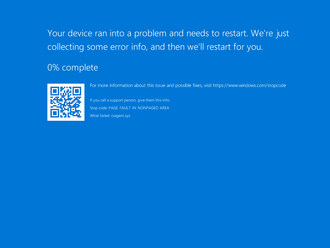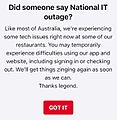2024 CrowdStrike incident facts for kids
Quick facts for kids 
Screenshot of a blue screen of death as captured on a Windows Server 2016 machine with the faulty CrowdStrike driver installed
|
|
| Date | 19 July 2024 |
|---|---|
| Location | Global |
| Type | Outage |
| Cause | Computer crash caused by a faulty CrowdStrike driver update |
On Friday, 19 July 2024, computer systems around the world faced a big problem. This problem caused many disruptions across different industries. It was all because of a faulty update to a security software called CrowdStrike, which is used on Microsoft Windows computers.
Contents
How It Happened
At 4:09 AM (UTC) on July 19, CrowdStrike sent out an update for its Falcon Sensor security software. This update included a faulty part called a kernel driver (csagent.sys). When Windows computers tried to use this faulty driver, they crashed. This crash is often called a "blue screen of death" because the screen turns blue with an error message. The message usually said PAGE_FAULT_IN_NONPAGED_AREA.
After crashing, many computers got stuck in a bootloop, meaning they kept restarting over and over, or went into a special recovery mode.
To fix the affected computers, people had to start them in a special way called safe mode. Then, they had to delete certain files (%windir%\System32\drivers\CrowdStrike\C-00000291*.sys). While this step was simple for one computer, it took a lot of time for large companies with many affected machines.
CrowdStrike quickly removed the bad update at 5:27 AM (UTC). Computers that started after this time were not affected. By 9:45 AM (UTC), the CEO of CrowdStrike confirmed that the fix was working.
What Was Affected
The computer problems were felt all over the world. Many businesses use Windows computers and CrowdStrike software. This meant that many different types of businesses had issues. More than 1,000 flights were cancelled globally, making the travel industry one of the most affected. CrowdStrike has about 24,000 customers, and many of these are very large organizations. So, it's hard to know exactly how many individual computers were affected.
Air Travel
Many airports and airlines had problems. Hong Kong International Airport had delays for check-ins. The Hong Kong Airport Authority started its emergency plan because airline websites and automatic check-in machines stopped working. Local airlines like Cathay Pacific and Hong Kong Express couldn't use their booking systems.
In the United States, major airlines like United, Delta, and American Airlines stopped new flights from taking off. Flights already in the air could continue. Allegiant Airlines also had to ground its planes.
In Europe, Swiss International Air Lines grounded 30% of its flights. Airports in the Czechia (Prague) and Budapest also had issues. Ryanair reported that its booking and check-in services were down. Planes couldn't land at Zurich Airport. Dutch airline KLM stopped most of its flights. Berlin Airport planned to stop flights until 8 AM (UTC). Lufthansa was also affected. In Brussels, employees had to check passengers in by hand. Spanish airports also faced disruptions.
In Asia, Spring Japan and Korean airline Jeju Air had problems. Some self-check-in machines at Singapore's Changi Airport were affected, causing delays. Airlines had to switch to manual check-in. Flights from Cebu Pacific and Philippines AirAsia were delayed. Long lines formed at Ninoy Aquino International Airport.
Africa
Banks in South Africa, including Capitec Bank, experienced computer issues.
Asia
China
Some companies let their employees go home early because of the computer problems. The phrase "Thank you Microsoft for an early vacation" became very popular on Weibo, a social media site. Many people reported seeing blue screens of death on their Windows computers.
India
Airlines like Air India, Indigo Airlines, and SpiceJet had outages. They had to give out handwritten boarding passes. Big IT companies like TCS and Infosys also faced problems. Thousands of employees had issues, and many devices were stuck in bootloops.
Israel
In Israel, emergency services like Magen David Adom and several public hospitals were affected. Other organizations, including Israel Post and some banks, also had problems.
Philippines
IT workers using Windows laptops saw the Blue Screen of Death. Major banks, phone companies, TV stations, and supermarkets were affected. Their point-of-sale (POS) systems, used for payments, crashed.
Banks like RCBC and Metrobank had their online systems down. E-wallets like Maya and GCash also reported issues. Even government websites, such as the House of Representatives of the Philippines, were down.
Other Asia
Malaysia's railway operator KTMB had technical issues with its ticketing system. Many companies in Singapore, including Singapore Airlines, Scoot, Singapore Post, and DBS Bank, reported service problems. Carpark gates at 185 locations in Singapore were also affected.
Europe
Belgium
In Belgium, people couldn't buy train tickets, and digital announcements at train stations were affected. Office computers for a media company (DPG Media Belgium) had problems, which impacted radio stations. Banks, postal services, government offices, and phone lines for city services in Antwerp were also hit.
A spokesperson for the National Railway Company of Belgium said that trains themselves were still running, but all digital apps were affected. They told passengers to listen to audio announcements and contact the train conductor if they couldn't buy a ticket.
The Centre for Cybersecurity Belgium said the impact in Belgium was limited. The FPS Public Health confirmed two hospitals were affected. They activated emergency IT plans, saying patient care was not impacted, only new patient admissions.
France
Several French TV channels, including TF1 and Canal+ Group networks, were affected. Phone and internet provider Bouygues Telecom announced that its customer service was unavailable. Charles de Gaulle Airport and Orly Airport also had problems with check-in and flight suspensions.
The operations for the 2024 Summer Olympics in Paris were also affected. The incident happened just after the Olympic Village opened, as athletes were arriving. Organizers said they used a backup plan. Only the delivery of uniforms and accreditations (ID badges) were impacted. The incident slowed things down, with the press center's accreditation desk closed and security checks done manually.
Germany
Two hospitals in Lübeck and Kiel cancelled non-emergency operations. Some stores of the supermarket chain Tegut had to close.
Ireland
The Irish Times reported that several Irish businesses, including Ryanair, were affected. Transport for Ireland said its apps were down. GAA clubs (sports clubs) couldn't get tickets for the All Ireland games.
Isle of Man
Manx Radio reported that doctor's offices (GP surgeries) were affected. Some flights to the island, especially from the United Kingdom, might have problems. Most other businesses were "unaffected."
Netherlands
Businesses in the Netherlands facing issues included Schiphol airport, KNAB bank, Transavia Airlines, and government services. Hospitals started cancelling operations and reducing medical care.
Norway
One of Norway's largest pharmacy chains, Apotek1, had to close its stores for a while.
Spain
ENAIRE's Aena, which manages airport traffic control, mentioned an IT outage on its website. All Spanish airports reported disruptions. Regional governments in Aragon, Basque Country, and other areas reported issues with their healthcare services.
Turkey
Turkish Airlines cancelled some flights to avoid problems. The website and mobile banking app of DenizBank could not be accessed.
United Kingdom
The 24-hour news channel Sky News couldn't broadcast live. The BBC's children's channel, CBBC, also had problems. Several airports, like Edinburgh and Gatwick Airport, experienced difficulties. Departure boards froze at Edinburgh, and automatic barcode scanning stopped working at Gatwick.
Rail companies were also affected. The National Health Service (NHS) said the issues were "causing disruption in the majority of [English] GP practices." Some services, like doctor's offices, couldn't view medical records, issue prescriptions, or make appointments. The London Stock Exchange was working, but couldn't update news on its website.
Gambling company Ladbrokes Coral and supermarket chain Morrisons also reported problems. Amadeus, which handles baggage at Heathrow, was affected. The UK government's COBR committee met to discuss the incident.
Other Europe
The health information system in Croatia was affected. A hospital in Portugal had problems. Several institutions in Slovakia were affected. The pharmaceutical company Krka in Slovenia had a full outage and sent its workers home. In Sweden, air traffic was disrupted. Tickets for soccer games and public transport couldn't be sold. A mine was evacuated as a precaution. Vodafone and other companies in Ukraine also had outages.
North America
Canada
Montreal-Trudeau International Airport and Toronto Pearson International Airport were affected. Vancouver International Airport also reported issues. The Canadian Broadcasting Corporation (CBC) was impacted.
United States
There were problems with the 911 emergency service in parts of Alaska, Arizona, Florida, and other states. In New Hampshire, 911 was completely down. Alaska also had issues with non-emergency call centers.
The shares (value) of both Microsoft and CrowdStrike dropped because of the outage. CrowdStrike's stock fell almost 12 percent before the market opened on Friday.
Oceania
Australia

Australian businesses and government agencies were affected. This included media companies, airlines, airports, supermarkets, hospitals, universities, and banks. Australian media firms like ABC and Nine Network had problems.
Airlines like Qantas and Virgin Australia were affected. A Sydney Airport spokesperson said the outage impacted some airline operations, causing delays. Melbourne Airport also had problems with check-in. Other airports like Canberra Airport and Brisbane Airport were also affected.
Stores and fast-food chains were hit, causing self-checkout and online order systems to stop working. Supermarkets had to put upside-down shopping baskets on self-checkouts. Fuel stations also had problems, with people unable to pay for petrol.
Supermarkets like Woolworths and Coles were affected. Banking apps were down for banks like NAB and Commonwealth Bank. Freight train operator Aurizon was affected. Regional trains in NSW and Victoria were cancelled or delayed. Some hospitals also had system problems.
Victorians were told to call 000 if a fire alarm sounded, as some automatic alarms might not call fire services.
The Australian government held an emergency meeting. The Prime Minister, Anthony Albanese, said the government was working closely with the National Cyber Security Coordinator. He confirmed there was no impact on critical infrastructure or emergency services like Triple-0.
New Zealand
Businesses in New Zealand facing issues included ANZ, ASB, Kiwibank and Westpac banks. Supermarkets like Woolworths and Foodstuffs had payment issues. Christchurch Airport and the Parliament also had problems.
Images for kids
-
The KFC mobile app was inaccessible due to the outage
See also
 In Spanish: Incidente de CrowdStrike de 2024 para niños
In Spanish: Incidente de CrowdStrike de 2024 para niños
 | Jackie Robinson |
 | Jack Johnson |
 | Althea Gibson |
 | Arthur Ashe |
 | Muhammad Ali |




